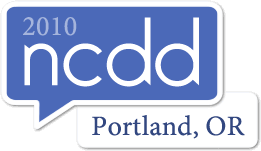Friday, November 19, 2010
Gov2.0 Meets D&D: Reflections on the Cascadia Conference on Dialogue and Deliberation (Part II)
 [Note: Cross-posted from leifutne.com.]
[Note: Cross-posted from leifutne.com.]Here are a few more observations I took away from NCDD 2010 Portland: The Cascadia Conference on Dialogue & Deliberation last weekend. You can read my earlier post about this excellent event here.
Gov2.0 meets D&D
There seems a be a convergence underway between the open government or "Gov 2.0" movement and the dialogue and deliberation (or D&D) community. The Gov 2.0 crowd is largely focused on opening up government datasets in the interest of transparency and civic innovation. It's largely driven by government techies and open-source geeks keen on exposing data to the public so that citizens can create apps that improve, augment, or streamline government services and make government more responsive and accountable. For example, see efforts like Open311, Portland's CivicApps project, the Vancouver Open Data Catalogue, the Open Gov West conferences, and Code for America.
Meanwhile, the D&D community has long focused on spreading better offline face-to-face interaction, through innovative social "technologies" like the World Cafe, Open Space, Future Search, Wisdom Councils, Study Circles, and Conversation Cafes. These are all structured dialogue or deliberation processes that are designed to better harness the collective intelligence of groups -- for better learning, discovery, planning, and decision-making. And maybe it's a generational thing (most D&D practitioners are not Net Natives), but until recently I've always sensed a general distrust of online communication technologies and strong preference for offline dialogue among most of my friends in the D&D community.
There are, of course, some notable exceptions that have long embraced technology, like AmericaSpeaks, MetroQuest, and the many online forums run by E-Democracy.org. Governments experimenting with online public consultation is not new. And there is a significant community of online facilitators that has been steadily growing for over a decade. But recent advances in deliberative software and the exponential growth of social media has changed the game, seeding the ground for much wider adoption of online public engagement strategies.
At the NCDD conference, I was excited to see a surge of interest in experimentation with new technologies for online outreach and citizen engagement, especially among government officials. I believe this is driven by several factors:
- Growth of Social Media: As citizens get used to interacting with businesses and nonprofits through social utilities like Facebook and Twitter, they're expecting to be able to interact with government officials and institutions via the same channels. Institutions are adopting enterprise social networking and collaboration tools internally, too. It only makes sense that those institutions would begin to engage the public via similar tools.
- Eroding Trust in Government: Public trust and confidence in government is at record lows. Conventional methods of public engagement -- public hearings, surveys, citizen advisory panels, public notices in newspapers -- are boring and ineffective, and may well spur more apathy than engagement. As state and local government budgets grow leaner by the day, officials are desperate for new approaches that could help them do more with less.
- Gov 2.0: The open gov meme is spreading fast by word-of-mouth in government circles. Public officials are seeing successful experiments with open data and the range of new technologies for collaboration and civic dialogue that are emerging. And many of them are eager to get in the game.
- Deliberative Software: Recent advances in online dialogue and deliberation technologies mean governments have more and better tools to choose from in crafting their public engagement strategies.
The need for fostering "equitable dialogue" was a strong undercurrent at the conference. In the World Cafe dialogue on Friday evening, one participant asked, "Is public engagement considered a leisure activity? For whom?" To which another replied that, unfortunately, Maslow was right -- the people who would benefit most from getting more engaged are also the most likely to consider civic activities leisure, especially when they are struggling to feed their families. Several participants pointed out that the crowd at the conference was overwhelmingly white and over 40. One of the facilitators kicked himself publicly when he realized that, despite holding the conference at a university, no notices were posted on campus inviting students to attend.
It was also pointed out that we need to be careful not to let our fascination with new technologies blind us to their shortcomings. The digital divide is still very real. That means we need to pay attention to accessibility, and keep legacy modes of engagement in place -- i.e. face-to-face hearings and community meetings, phone surveys, etc. -- so that nobody is left out. Because for democracy to truly work, everybody needs a seat at the table.
Labels: collaboration, deliberation, democracy, design, dialogue, gov2.0, leadership, ncdd, ncddpdx, open government, oregon, portland, transparency, world cafe, Zanby
Posted by Leif Utne at 1:58 AM


Post a Comment